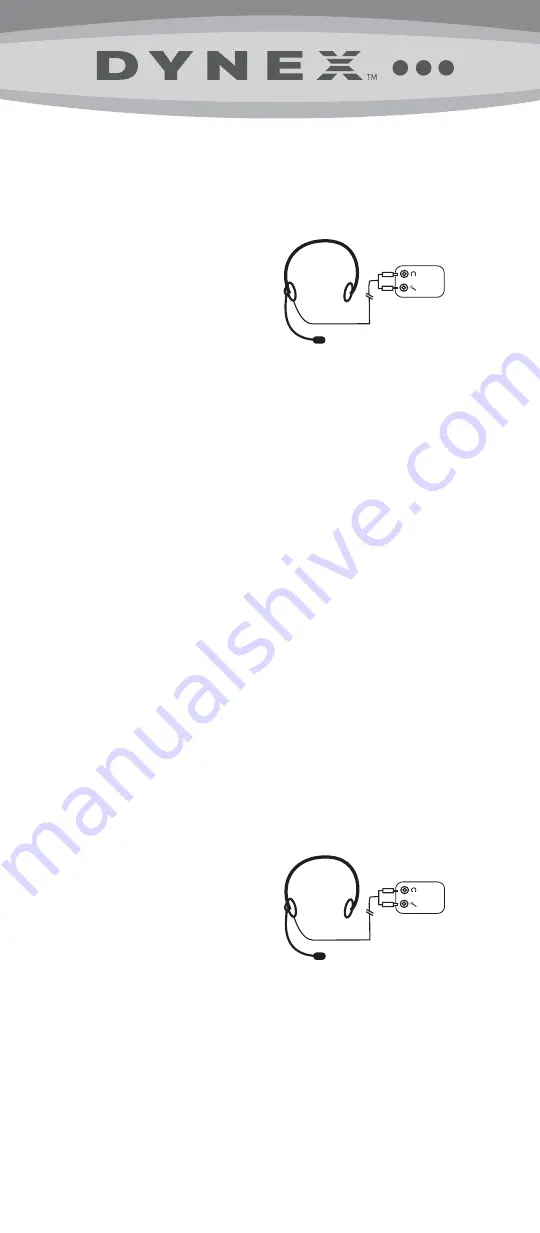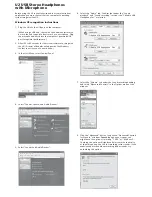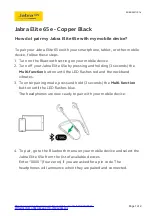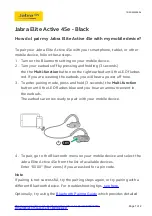
Dynex headset with noise-cancelling microphone •
DX-28
Casque d’écoute avec microphone suppresseur de bruit Dynex
Auriculares con micrófono con cancelación de ruido Dynex
Using the headset
Installing your headset
To install your headset
Plug the green and pink connectors into the
corresponding ports on your computer.
Testing your headset
To test your headset
1. Plug in your headset.
2. Start the Sound Recorder application (Click
Start
, then select
All Programs
,
Accessories
,
Entertainment
).
3. Click
Record
and speak into the headset for 5 – 10 seconds.
4. Click
Stop
, then
Play
. If you can hear your recording through the headset, it is working correctly.
Adjusting the volume
You can adjust the volume by turning the volume knob on the headset, or using the Windows volume
control in the Control Panel. Your computer may also have volume buttons to adjust the Windows
volume control.
Troubleshooting
If your headset does not function correctly, try the following:
• Make sure your headset is properly plugged into the correct ports.
• Make sure the volume is set to a medium level, and is not muted.
Legal notices
FCC statement
This equipment has been tested and found to comply with the limits for a Class B digital device, pursuant to Part 15 of
the FCC Rules. These limits are designed to provide reasonable protection against harmful interference in a residential
installation. This equipment generates, uses and can radiate radio frequency energy and, if not installed and used
in accordance with the instructions, may cause harmful interference to radio communications. However, there is no
guarantee that interference will not occur in a particular installation. If this equipment does cause harmful interference
to radio or television reception, which can be determined by turning the equipment off and on, the user is encouraged
to try to correct the interference by one or more of the following measures:
• Reorient or relocate the receiving antenna.
• Increase the separation between the equipment and receiver.
• Connect the equipment into an outlet on a circuit diff erent from that to which the receiver is connected.
• Consult the dealer or an experienced radio/TV technician for help.
ICES - Canada’s Interference-Causing Equipment Standards This equipment complies with the applicable technical
standards of ICES 003:1997 in accordance with the measurement procedures specifi ed in CISPR22-96.
Copyright © 2007 Dynex. DYNEX and the DYNEX logo are trademarks of Best Buy Enterprise Services, Inc. Other brands
and product names are trademarks or registered trademarks of their respective holders. Specifi cations and features are
subject to change without notice or obligation.
One Year Limited Warranty
For complete warranty go to www.dynexproducts.com.
Utilisation du casque d’écoute
Installation du casque d’écoute
Pour installer le casque d’écoute
Branchez les connecteurs vert et rose sur les ports
correspondants de l’ordinateur.
Test du casque d’écoute
Pour tester le casque d’écoute
1. Branchez le casque d’écoute.
2. Démarrez l’application Sound Recorder [Magnétophone] (Cliquez sur
Start
[Démarrer] puis
sélectionnez
All Programs
[Tous les programmes],
Accessories
[Accessoires], Entertainment
[Divertissement]).
3. Cliquez sur
Record
(Enregistrer) et parlez dans le casque d’écoute pendant cinq à 10 secondes.
4. Cliquez sur
Stop
(Arrêter) puis sur
Play
(Lecture). Si vous pouvez entendre votre enregistrement en
utilisant le casque d’écoute, ce dernier fonctionne correctement.
Réglage du volume
Vous pouvez régler le volume en tournant le bouton du volume du casque d’écoute ou en utilisant le
contrôle de volume de Windows dans le Panneau de confi guration (Control Panel). Votre ordinateur
peut également avoir des boutons de réglage du volume.
Problèmes et solutions
Si votre casque d’écoute ne fonctionne pas correctement, essayez ce qui suit :
• Vérifi ez que le casque d’écoute est connecté correctement sur les ports.
• Vérifi ez que le volume est réglé sur un niveau moyen et n’est pas mis en sourdine.
Green
Pink
Sound card or
other sources
Vert
Rose
Carte son ou
autres sources




















